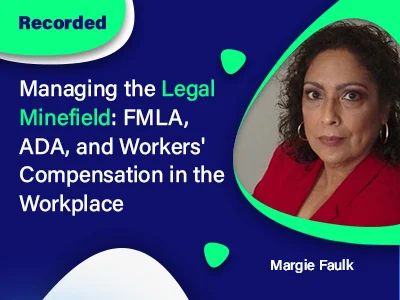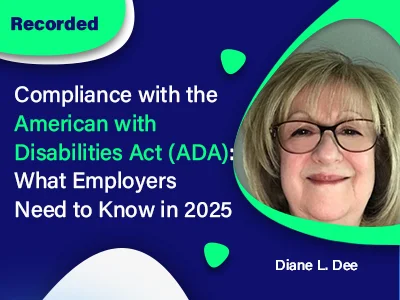Currently Empty
RECORDED TRAINING COURSE
If there’s ever a time to rethink your handbook, it’s now. The timeliness has less to do with the 2025 year — the obvious time to roll out a replacement handbook — and more to do with the wave of changes that recently swept the workplace based on the change in administration. It is clear that the changes expected by the new administration will impact the workplace including the Employee Handbook.
The National Labor Relations Board (NLRB) now has submitted its new Employee Handbook changes that can make Employee Handbooks legally unlawful. The NLRB has the authority to monitor and make changes to employee handbooks for union and non-union workplaces. The NLRB mandates that employee handbook policies do not prevent employees from discussing with their colleagues issues about workplace issues like pay, benefits, and safety issues, and speaking negatively about the company or supervisors. This legal protection is called “Concerted Activity from Section 7 of the National Labor Relations Act (NLRA).
Federal, State, and Local regulations are in place and regulatory agencies are revving up audit focus for 2025 and beyond. Many state regulations and multi-state regulations are impacting which laws supersede federal regulations.
Workers’ new expectations may clash with employers’ old policies. Policies that ban flexibility, certain policies as per the National Labor Relations Board, and concerted activity may feel frustratingly out of date.
And yet, many organizations punt on handbook refreshes. Research has shown that many companies don’t update their employee handbooks as often as they should.
With the shift to hybrid work/Remote work, organizations must set clear expectations around communication, and performance. Managers and associates both play a significant role in making policies successful within their teams, and HR teams have an opportunity to provide tools and guidelines to make it even easier.
Session Highlights:
- Participants will learn, identify, and prepare for employee handbook violations.
- Participants will be aware of all the new regulations that will impact their company.
- The course will identify the most common employee handbook violations and how to mitigate them.
- Learn how the Department of Labor (DOL), and Equal Employment Opportunity Commission (EEOC) adapted to the changes based on the results of the elections
- Learn how to change regulations to be compliant with employee handbook policies
- Participants will learn which regulatory agency will focus on which regulation and mitigate the risk
- Participants will learn what policies will land them in hot water.
- What policies are “must have” for your employee handbook?
- Social media and the impact of penalties when employees choose to speak negatively about their Employer.
- Learn why Employers need to follow the National Labor Relations Board and why they should care about policies that can be unlawful with new requirements.
- Learn how your managers/supervisors can be your ambassadors in workplace compliance or your downfall
Why You Should Attend:
Federal regulations are not the only changes that are expected. We have learned that State regulations have superseded the Federal regulations because the regulation with the most benefit for the employee supersedes them. Many states have several changes that impact employees in state-specific and multi-state locations. When you add remote workers, there are many changes that have to be in place where compliance is key.
Who Should Attend:
• All Employers
• Business Owners
• Company Leadership
• Compliance professionals
• Payroll Administrators
• HR Professionals
• Managers/Supervisors
• Small Business Owners
Note: You will get access to the Recording link and E-Transcript; in your account and at your registered email address.

1. What is a Difference Between Recorded and Download Course?
The difference between the Recorded Course and the Download Course is how attendees can access the content:
Recorded Course: Attendees can watch the recorded live sessions online at their convenience. They receive a link after purchasing, giving them lifetime access to stream the course, but they need an internet connection to view it.
Download Course: In this option, attendees can both stream the webinar online and download it for offline viewing. This gives them the flexibility to watch without an internet connection whenever they prefer.
2. What is a Live Online Course/Webinar?
A live online course or webinar is a virtual conference held on the internet, attended by an online audience. It offers interactive features such as synchronized slides, Q&A sessions, chat, and polling.
3. What is a Recorded Course/Recorded Webinar?
The recorded training course captures live online sessions on related topics. Attendees can purchase it through our website, receiving a link to watch the recording at their convenience with lifetime access.
4. What is an E-Transcript?
An E-Transcript is a written PDF file containing a word-to-word recording of the presentation.
5. What is Download Course?
Download Course allows users to download the webinar for offline viewing without an internet connection.
6. What is the Registration Process for Live Online Training Course?
a) Online Registration:
-
- Create a new account on Simplify Trainings.
- Select the desired training course.
- Fill in basic details in the checkout form.
After successful registration, attendees receive a confirmation email and instruction kit 1-2 days before the live online course.
b) Offline Registration:
- For offline registration queries, contact us via chat or email at “support@simplifytrainings.com”.
7. What if I’m Unable to Attend the Live Online Training Course?
- Registered attendees receive a recording link.
- Those unable to attend live can purchase the recorded version for future viewing.
8. How Do I Access My Registered Live Online Training Course?
- An instruction kit is sent to all attendees 2 days before the webinar.
- Follow the instructions to join the webinar on time.
9. What If I Don’t Receive the Webinar Joining Kit?
- Check spam or junk folders 24 hours before the live webinar.
- The instruction kit is sent from support@simplifytrainings.com.
- If not found, email support@simplifytrainings.com. Provide an alternate email during registration for timely instructions.
10. Will I Receive Any Conference Materials?
- Yes, an email with an attached PDF copy of all reference materials will be sent to all attendees related to the training course.
11. Can I Ask Questions to the Speaker During the Live Webinar?
- Certainly, a Q&A session is held at the end of the live webinar. The operator will guide attendees, and questions can be directed to our expert speaker.
12. What Are the Basic Requirements to Attend a Live Online Training Course?
- A smartphone, computer, laptop, or iPad with a good internet connection is all that is needed. Dial-in details for audio and a live webinar link to view the presenter’s screen will be provided.
13. What Payment Options Are Available?
- We accept all types of credit cards, debit cards, and payments through PayPal Invoices. All transactions are secure, and no credit card information is stored.
14. Can I Pay via an Invoice?
- Yes, we do accept payments via invoice. For more information and the complete process, email our customer support at “support@simplifytrainings.com“





